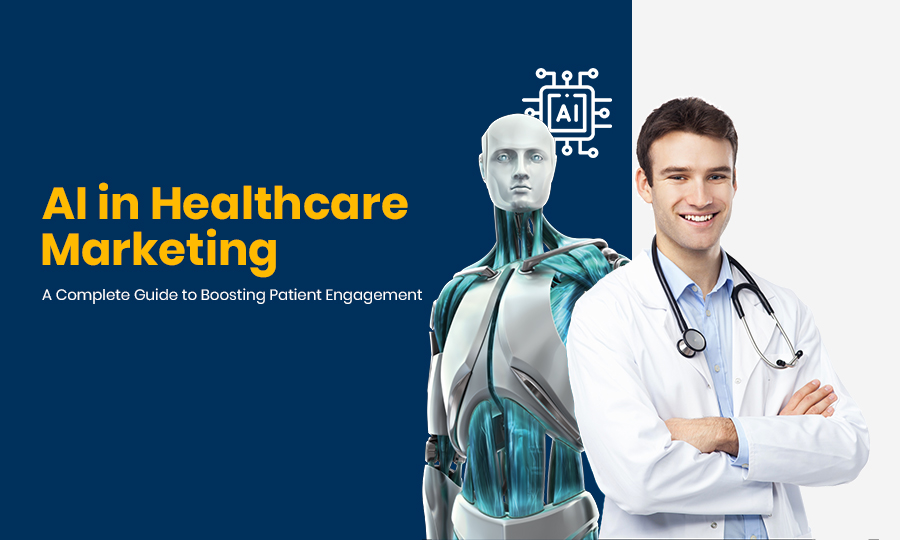In recent years, AI has revolutionized the marketing sector. And the healthcare sector is no exception. With more and more patients turning to the Internet to search for symptoms online before seeking medical consultation, AI in healthcare marketing is no longer a need but a necessity. AI can be a game-changer for your healthcare practice by transforming operations through automation, fostering innovation, and enabling in-depth data analysis.
According to research by Morgan Stanley, 94% of healthcare organizations said they employ AI in some capacity. By implementing Artificial intelligence, healthcare businesses can not only stay competitive in the highly crowded market but also transform the way they connect with their audiences. Furthermore, artificial intelligence eases the process of healthcare marketing by automating regular tasks, making patient outreach more efficient than ever.
Are you a healthcare professional who is looking to incorporate AI in your healthcare marketing strategy? Then this blog is for you. It will discuss the importance of artificial intelligence in healthcare marketing, ways to implement AI, steps to create an AI digital marketing strategy, and more. So let’s get started.
What is AI in Healthcare Marketing
AI in healthcare marketing is the implementation of artificial intelligence technologies, such as natural language processing and machine learning, to assess patient data, customize outreach, automate regular tasks, and optimize campaigns for healthcare providers and clinics.
This opens the door for higher patient engagement, better patient acquisition, and more operational efficiency by delivering customized content at scale while guaranteeing regulatory compliance and patient privacy.
Importance of AI in Healthcare Marketing
Artificial intelligence offers numerous benefits for healthcare marketing efforts. This includes:
- Better Audience Targeting
AI algorithms have the ability to evaluate vast amounts of patient and consumer data, including online behaviour, demographic data, and medical records.
By identifying meaningful trends and patterns, AI allows healthcare practices to segment audiences with the highest accuracy.
This enables a more targeted outreach based on their interests in a service, specific health concerns, and lifestyle factors.
As a result of this, healthcare professionals can craft more precise messages, minimizing wasted ad spend and considerably enhancing the performance of their campaigns.
As a result of this, healthcare providers can focus on offering high-quality patient care, leading to improved patient outcomes.
- Enhanced Speed and Efficiency
AI can simplify various aspects of the marketing process by automating the routine and time-consuming tasks.
Healthcare marketers can incorporate advanced AI tools to handle tasks such as evaluating performance data, generating detailed reports, and optimizing ad placements.
This lowers the dependency on manual labour, reduces rates of human error, and increases the timeline from the planning of the campaign to its execution.
- Data-Driven Decision Making
With AI-driven insights, healthcare professionals can gain in-depth knowledge of patient behaviour and campaign performance.
Predictive models have the ability to estimate service demands or patient needs. On the other hand, real-time dashboards monitor key metrics such as engagement rates, conversion rates, and audience interactions.
This permits healthcare organizations to function swiftly when performance data indicates a need for change, such as targeting various patient groups, modifying messaging, or reassigning budget.
By making smart decisions endorsed by authentic data, marketing strategies for healthcare providers become more valuable and impactful.
- Improved Patient Experience
AI technologies such as virtual assistants and chatbots can help healthcare providers enhance the overall patient journey. These tools provide instant support for standard tasks such as scheduling appointments, answering FAQs, examining insurance coverage, and locating clinics in close proximity.
These tools are available 24/7, guaranteeing that patients receive proper assistance without having to wait for a much longer time and navigate complex website layouts.
By lowering disruption to user experience, these AI solutions foster trust, credibility, and satisfaction among patients, encouraging them to remain hooked with your healthcare marketing services.
6 Ways Healthcare Providers can Implement AI
To successfully implement AI in healthcare marketing, here are 6 helpful ways that they must follow.
- AI-Powered Chatbots and Virtual Assistants
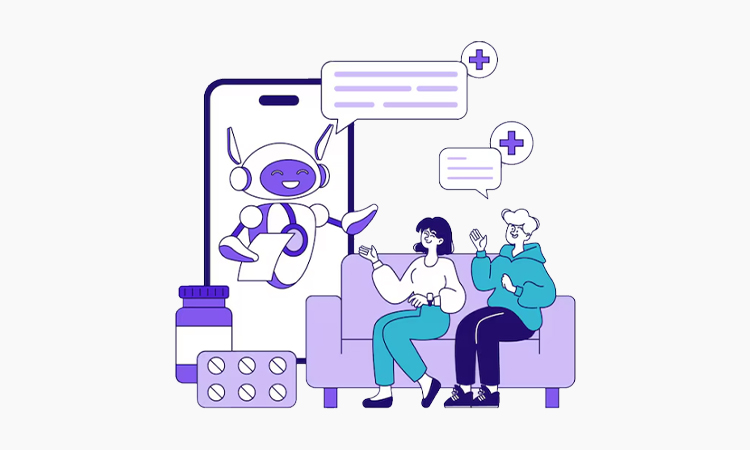
Over the years, AI tools such as virtual assistants and chatbots have emerged as a trend. These tools are being heavily used for patient interaction in the healthcare sector. According to PatentPC, 69% of customers prefer chatbots for quick communication with brands.
For healthcare professionals, these systems can serve as a boon by handling boring, everyday tasks such as guiding patients through the pre-screening processes, scheduling or rescheduling appointments, or answering frequently asked questions.
These tools operate around the clock, offering instant, seamless, and consistent responses that improve the patient experience. Moreover, chatbots can be specially designed to escalate more complex concerns to humans, guaranteeing that patients always receive accurate and the best possible assistance.
By simplifying patient interactions, healthcare practices can cut down their operational cost and boost patient engagement and satisfaction.
- Customized Content Creation

AI allows healthcare marketers to go beyond general messaging by assessing individual patient data, including search behaviour, past interactions, and demographics.
This information enables the creation of a lot more personalized content, such as hyper-targeted social media ads, customized email newsletters, and effective website content that adjusts based on user preferences.
For example, if a patient searches for pediatric services often, they would want to receive customized content about children’s health programs. By implementing artificial intelligence, healthcare professionals can develop content, especially tailored for their target patients.
This relevance enhances brand loyalty, engagement rates, and leads to better health results through more educated patients.
- Automation of Marketing Operations
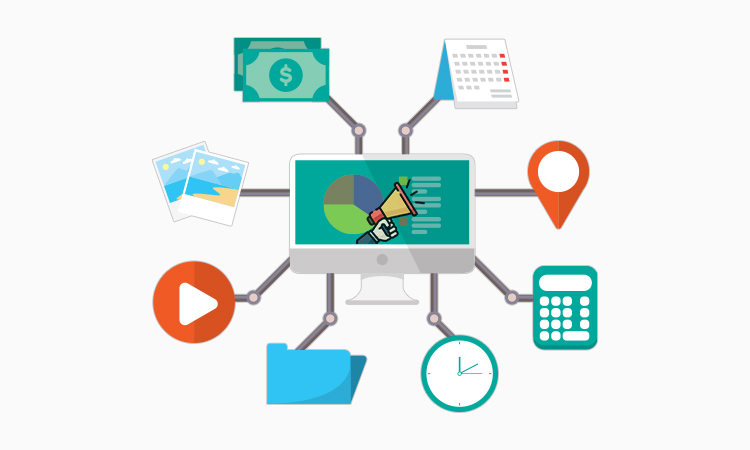
Artificial intelligence is revolutionizing the way healthcare providers handle marketing operations by automating tedious tasks.
Tools that are driven by machine learning can arrange and schedule campaigns, prioritize leads based on patient behavior scoring, and provide detailed insights on campaign performance.
By helping healthcare practices handle routine tasks, AI allows them to focus on offering high-quality care to their patients.
- Predictive Analytics for Targeted Campaigns
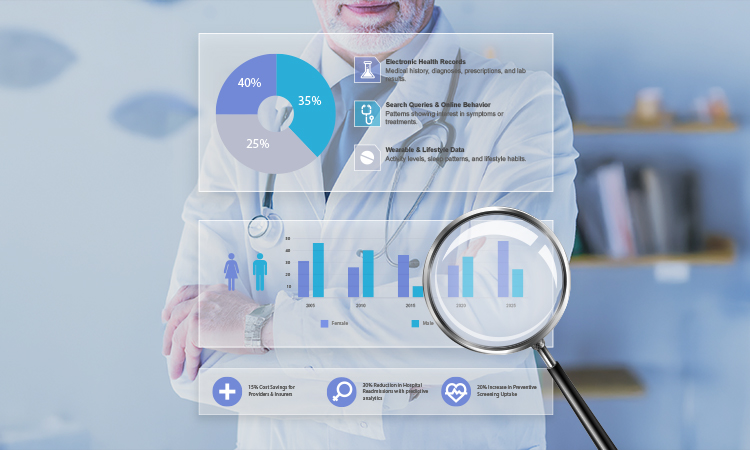
AI-powered predictive analytics leverages past healthcare data and advanced machine learning models to forecast future trends and behaviours.
In healthcare marketing, this indicates identifying individuals who are likely in need of specific healthcare services based on health records, search queries, or lifestyle factors.
Healthcare professionals can introduce hyper-targeted campaigns that directly communicate with these individuals. For example, promoting rabies vaccinations to high-risk populations or giving out reminders to future mothers about prenatal care.
The data-driven strategy of AI not only enhances the effectiveness of your campaign but also guarantees that your outreach efforts are both cost-saving and timely.
- Social Media Monitoring and Sentiment Analysis
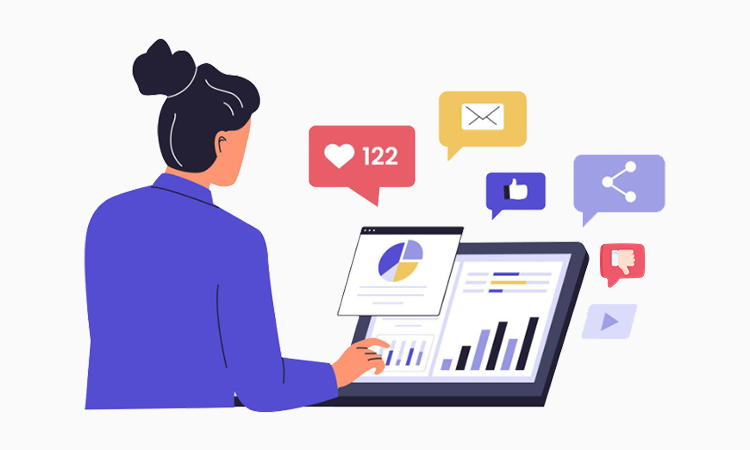
An AI-generated sentiment analysis tool to monitor social media platforms, review sites, and online forums to determine how patients feel about your healthcare practice or services.
These tools closely track the tone, context, and emotion of user-generated content and help healthcare professionals to understand public sentiment in real-time. In case there is a sudden rise in negative comments, healthcare providers can instantly address the concerns and tailor messaging to regain trust.
This level of real-time feedback, which is offered by AI, can encourage healthcare organizations to stay in touch with their patients and maintain a responsive and patient-first reputation.
- Voice Search Optimization

Voice Search Optimization is the process of customizing a website’s content and structure to improve rankings in voice search results from virtual assistants such as Siri, Alexa, and Google Assistant.
In recent years, VSO has been increasing in popularity due to the increased usage of these voice-activated devices. By the year 2026, it is estimated that 80% of healthcare interactions will include voice technologies.
This is one of the unexplored SEO opportunities that can help healthcare businesses to make their businesses appear on AI overviews and get more website traffic.
AI in healthcare marketing helps practices to analyze the latest trends of voice search and modify content accordingly.
This adds a more conversational and natural tone in website copy and developing content that answers common voice-related questions. For example, “Best urgent dental care near me” or “How to book a doctor’s appointment virtually?”
Voice Search Optimization guarantees that healthcare information is easily accessible to patients, especially for visually impaired patients or those who prefer hands-free interaction.
Steps to Create an AI Digital Marketing Strategy for Healthcare
Now that we know the benefits of Artificial Intelligence in healthcare marketing, we will discuss the steps that healthcare businesses must follow to create an effective AI digital marketing strategy.
- Evaluate your Current Strategy
The first step to creating an AI digital marketing strategy is to evaluate the status of your current strategy. It does not matter whether you are willing to use AI, have already started using it, or have been using it for a while now. It is very important to consider your digital marketing strategy.
Ask yourself, when was the last time you reviewed your digital marketing strategy? Does it include artificial intelligence? Or have you implemented any AI tools into your strategy?
It is crucial for healthcare professionals to determine the status of their current strategy in order to stay updated.
- Define your Objectives
Now that you have reviewed the current status of your marketing strategy, it is important to determine what you want to achieve by incorporating AI in your healthcare business.
Contemplate:
- What are your current challenges?
- What objective do you wish to achieve?
For instance, do you wish to lower the workload for your staff by automating regular tasks? Or do you want to minimize the time spent on answering patient queries?
Healthcare businesses must be clear about their goals from scratch so that they can implement AI in order to achieve them.
- Assess your Data
We all know, AI loves data. So it is the job of a healthcare provider to collect the right data for AI to analyze successfully. And by “right” data, it means information that is relevant and accurate.
So, healthcare providers must review their existing data sources, such as website analytics with Google Analytics, email metrics, patient past records, and social media metrics.
You may have already gathered insights from your data. However, how you leverage AI tools to achieve in-depth insights on trends, opportunities, and patterns for improvement.
- Choose your AI Tools
Your objectives will determine the AI tools you choose and must help you achieve your marketing goals. According to an article by Harvard Business Review, healthcare professionals must categorize prospective AI applications based on their structure and level of intelligence. This will help you choose the most suitable tools and plan the introduction of AI for marketing purposes.
The secret is to integrate stand-alone applications, such as chatbots, with more advanced AI tools, and those that can be combined with systems get the best value possible.
- Segment your Audience
Health systems must incorporate AI-driven data to segment patients based on common behaviours and traits. This segmentation allows them to create personalized campaigns and messages to enhance engagement.
According to Twilio Segment, 89% of industry leaders believe that personalization is crucial for their business’s success. This statistic shows the importance of segmentation and targeting for healthcare businesses that are willing to reach their target audience.
By implementing AI tools, healthcare professionals can not only analyze patient data, engagement patterns, and demographics to create targeted patient groups. This allows marketers to create detailed patient profiles and deliver personalized content that perfectly aligns with each segment.
- Automate Workflows and Campaigns
When you are well-aware of your marketing goals, the right AI tools for your marketing activities, and your audience, it is finally time to start automating.
Healthcare professionals need to determine the regular and simple tasks that they can automate, such as reporting, data entry, and appointment scheduling, so that they can focus on other crucial tasks.
For instance, for marketing purposes, healthcare professionals can leverage AI to automate ad placements, social media posts, and email sequences. AI can also be effective for audience segmentation and delivering customized content based on patient needs and behaviour.
- Experiment and Optimize
Digital marketing is not a “Set it and forget about it” strategy. For effective AI in healthcare marketing, medical practices need to constantly keep track of their AI digital marketing strategy to make sure their campaigns are relevant and highly personalized.
Implementing AI can help healthcare providers analyze and modify campaigns on the basis of real-time data. By leveraging AI-powered A/B testing, healthcare professionals can enhance their ad creatives, email subject lines, and other marketing elements. Closely monitoring AI-generated data can help enhance performance.
- Measure Effectiveness
In order to determine the effectiveness of a marketing activity and campaign, it is crucial to measure it. The same goes for AI-driven initiatives. Healthcare providers must track Key Performance Indicators (KPIs) such as Return on Investment (ROI), patient lifetime value, and conversions.
By implementing AI tools such as Google Analytics, healthcare businesses can keep track of campaign effectiveness in real time and offer recommendations for further optimization.
Steps to implement Google Analytics to track campaign effectiveness:
Step 1: Set Up Google Analytics
First, healthcare professionals need to make sure they have Google Analytics properly set up on their website. If they have not done it already, here is a quick sneak peek.
Navigate to Google Analytics> Create a new account in case you do not have an account or sign in> Add your website as a new property> Follow the instructions to install the tracking code on your website.
Once you are done setting up Google Analytics and tracking website traffic, healthcare professionals must proceed to the next step, which is campaign tracking.
Step 2: Leverage UTM Parameters
In order to track campaigns in Google Analytics, healthcare providers need to implement UTM parameters. UTM parameters are basically small snippets of text that healthcare systems can use in their URLs to inform Google Analytics where their traffic is coming from.
- UTM Source: Where the traffic is coming from. (e.g., Newsletter, Facebook, or Google)
- UTM Medium: The type of traffic that is coming. (e.g., social or email)
- UTM Campaign: The particular campaign name or identifier. (For example: “Connect to What Matters Most” or “Patient Stories”)
For instance, if you are running a Facebook ad campaign for a health feast, your URL must appear like this:
“https://www.yourwebsite.com/?utm_source=facebook&utm_medium=social&utm_campaign=healthfeast”
By leveraging these UTM parameters, healthcare providers can craft a customized URL that will enable Google Analytics to monitor and track their campaigns successfully.
Step 3: Track Campaigns through Google Analytics
Once you are done adding UTM parameters to your healthcare campaign links, it is time to track the data in Google Analytics. Here are a few steps you must follow in order to do this.
- Firstly, log in to Google Analytics
- Now go to “Acquisition“> “Campaigns“> “All Campaigns“.
- Track Campaigns in Google Analytics- The Campaigns Report
- Here, healthcare professionals will notice a list of all the campaigns they have tracked using UTM parameters. You will be able to view engagement, traffic, and conversion rate for every campaign.
This is where healthcare providers will be able to track which campaigns are performing well and which one needs improvement.
Step 4: Perform In-depth Campaign Analysis
Google Analytics allows healthcare businesses to monitor more than just clicks. It also offers data on visitor activities after they land on your website. Here is how healthcare practices can implement campaign analysis to get the best value.
- Behaviour Reports: Let’s healthcare professionals see how patients engage with their website. Do they spend time reading your blog posts? Or are they leaving before navigating to any other pages? Knowing these will help healthcare professionals modify their landing pages and enhance the user experience.
- Goal Conversions: Healthcare businesses need to set goals to track specific actions, such as form submissions, newsletter sign-ups, or appointment scheduling. This will help them determine the ROI of each campaign.
- E-commerce Tracking: If you are a healthcare professional who manufactures your own products and has an online store, setting up e-commerce tracking will help you see which campaigns are driving sales. Healthcare professionals can track the conversion rates, total revenue, and even which products are the most popular.
Step 5: Campaign Monitoring
To successfully integrate AI in healthcare marketing, it is crucial to monitor campaigns. Monitoring a campaign is an ongoing process. When you are done setting up tracking, you should constantly review your campaign data.
A few things healthcare professionals must look out for in this process are:
- Comparison of campaign performance: Healthcare companies must check metrics such as average session duration, bounce rate, and conversion rates. In case one campaign underperforms, healthcare professionals must modify their targeting or creatives.
- Pinpoint the top sources of traffic: Campaign tracker tools can help healthcare businesses track which channels are bringing in the most traffic. If your healthcare practice is getting a good amount of visits from social media but very few conversions, you must consider modifying your landing pages or CTAs.
- Time period comparison: Healthcare industry professionals must compare campaigns with time to figure out if there are any specific patterns or trends. This will help them devise their future campaigns more easily.
Step 6: Establish Tracking Goals
If a healthcare practice wishes to measure the success of its marketing efforts in a more organized way, it must set up tracking goals in Google Analytics. This tool will help healthcare professionals to:
- Monitor specific actions that visitors take on your site.
- Measure conversions such as form submissions and appointment bookings.
- Evaluate campaign performance with high precision.
To set tracking goals in Google Analytics, navigate to Admin> View> Goals. Then click on “New Goal“> Now choose a goal template, or you can also set a custom goal. (e.g., duration, destination, pages/screen per session)> Fill up all the necessary details and click on “Save.”
By setting these goals, healthcare practices can not only track the direct impact of their campaigns but also make improvements where needed.
Step 7: Refine and Scale
AI is designed to learn, so with time, AI tools will learn more as they gather more data. This will allow healthcare businesses to modify their strategy by personalizing messaging, marketing channels, and audience segments on the basis of insights.
These AI-driven data can help healthcare practices modify and improve their campaigns to scale their AI efforts as their business expands, and incorporate what they have learnt to new platforms and campaigns.
Creating an AI digital marketing strategy is not an easy job. So, if healthcare practices find the process too overwhelming, they can partner with a professional healthcare marketing agency that specializes in AI digital marketing.
How can Healthcare Providers Use AI to Incorporate a Digital Marketing Strategy?
When creating a digital marketing strategy, healthcare organizations can incorporate AI tools to help with:
- Driving Higher Efficiency and ROI
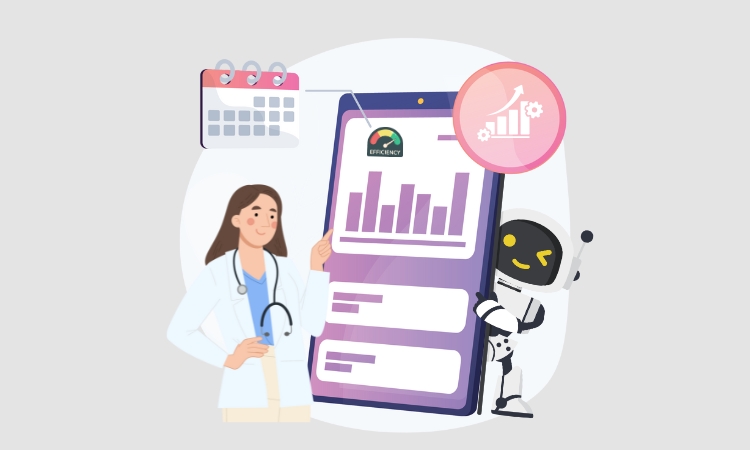
- Automate Content Creation: AI tools such as Jasper and Claude can produce high-quality content drafts for social media, articles, and blogs. These tools allow healthcare professionals to focus on delivering top-notch patient care.
- Customize Content at Scale: Implement AI to personalize marketing messages across various channels to patient segments, enhancing engagement and boosting conversion rates.
- Automate Daily Tasks: Artificial intelligence can enhance productivity by seamlessly automating regular tasks. For example, incorporate chatbots to automatically respond to patient queries and guide patients through the funnel.
- Boost Creativity: Generative AI tools such as Desigify can help healthcare professionals in creative purposes, such as product design and development.
- Strategic Planning
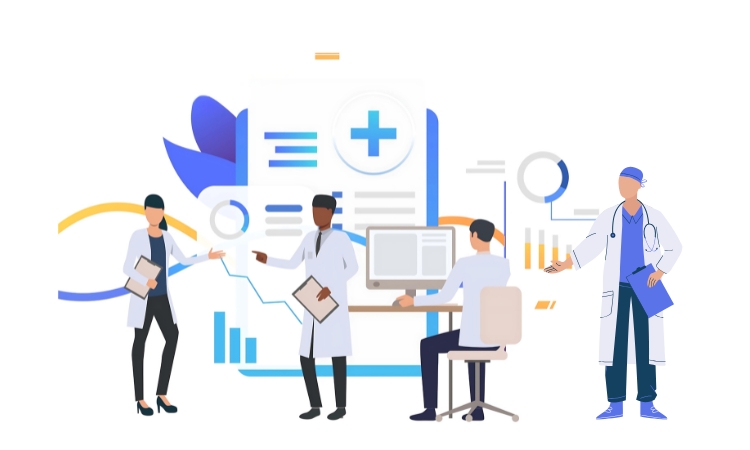
- Establish strategic plans: Incorporating AI in healthcare marketing is crucial. Healthcare providers can incorporate tools such as ChatGPT to develop complete strategy documents that leverage data inputs to draft an actionable strategic report.
- Assume various strategic outcomes: an AI tool, such as Riskminer, can help healthcare companies promote scenario planning by assuming strategic outcomes. This helps a medical practice evaluate the impacts of any decisions or reduce the possibilities of risks.
- Improve Design-making: AI tools such as RiskLens can help healthcare professionals analyze vast amounts of data to identify hidden risks and emerging opportunities that might not be found otherwise.
- Driving and Calculating on ROI
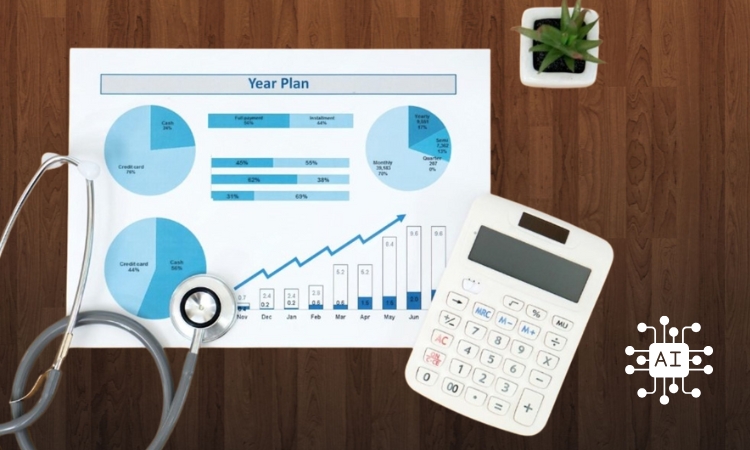
- Track and evaluate metrics: Healthcare providers can leverage AI tools such as Google Ads to monitor ad effectiveness and calculate the ROI of digital marketing campaigns.
- Estimate ROI: An AI tool, such as Salesforce, can evaluate campaign performance to estimate the prospective ROI of a service launch so that healthcare practices can plan more effectively.
- Figure out cost-effective channels: You can incorporate AI platforms, such as HubSpot, to compare the ROI of social media advertising versus email marketing.
- Adjust Budget: For healthcare professionals, AI tools can suggest an optimal budget distribution across various marketing activities to achieve the best outcomes.
- Implement Omnichannel Strategy
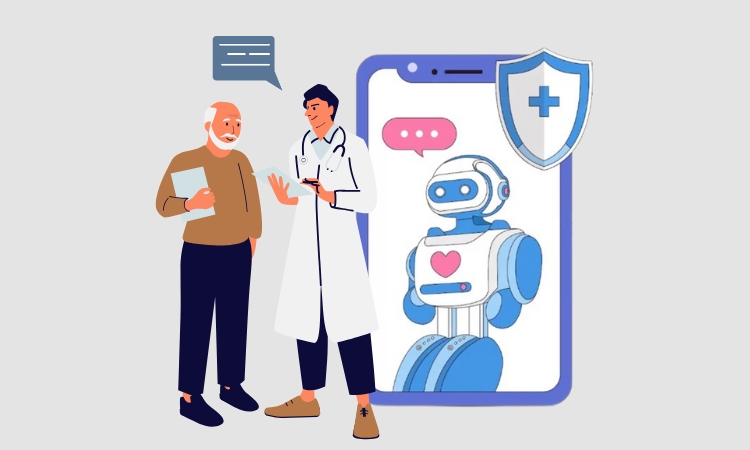
- Incorporate and analyze data: Healthcare professionals can implement AI tools such as ChatGPT to collect and process data from various sources to get a comprehensive view of patient behaviour across various platforms.
- Optimize cross-channel activity: Implement Google Analytics 360 to monitor and track conversions to different marketing channels to get in-depth information on the channel that boosts sales.
- Enhance the Patient Journey: Healthcare practices can implement AI to outline the patient journey from the initial contact to booking an appointment to enhance engagement and identify opportunities.
- Offer real-time insights: By incorporating AI tools such as Adobe Analytics to monitor the success performance of omnichannel strategies and offer data for improvement.
- Strategic Innovation
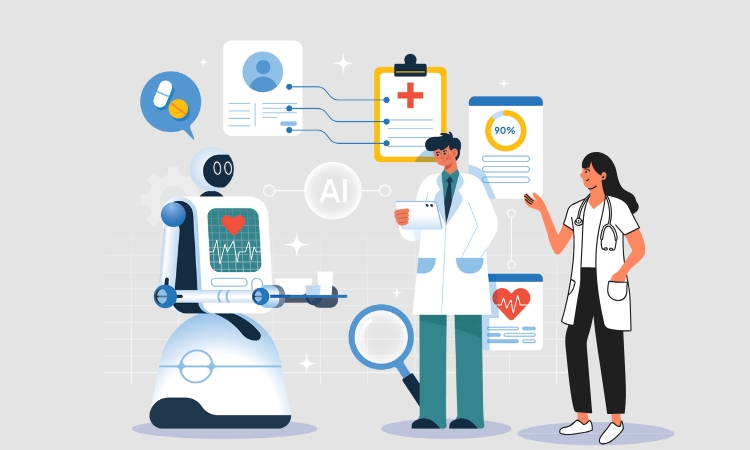
- Determine new trends and technologies: Healthcare practices can assess a large amount of data to identify emerging trends and prospective challenges in the healthcare sector.
- Support innovation: By implementing AI tools such as Canyon, healthcare businesses can track their competitor activities and patient reviews to determine challenges in the industry.
- Generate solutions: Healthcare companies need to consider and generate strategic solutions for campaigns by implementing AI tools such as Claude to get suggestions regarding campaign themes and marketing angles.
Potential Risks and Ethical Implications of Incorporating AI in the Healthcare Sector
Although AI is a boon for healthcare businesses, it can also pose serious threats to them at the same time. As a rapidly emerging generative technology, healthcare practices need to take a holistic approach to any potential risks, including an established strategy, effective management, and a powerful commitment to responsible AI. Here are the 5 most common risks that are posed by Artificial Intelligence.
- Lack of Transparency:
Healthcare businesses need to understand what information AI is looking at and what it is concluding to be transparent. If not, there could be a lack of trust in the technology.
- Job Displacement:
AI-driven automation can lead to job losses. A proper workforce needs to adjust and upskill to use the power of AI so that they can transition into new roles.
- Violations of Privacy:
AI systems gather and evaluate a vast amount of data from various channels. Healthcare businesses need to protect sensitive health information by strictly adhering to data privacy regulations such as HIPAA guidelines and GDPR, to create privacy guidelines.
To know more about HIPAA compliance, click here.
- Promote Bias:
AI in healthcare marketing uses data from healthcare practices to offer insights and make informed decisions, so it is important to make sure that there is no deep-rooted bias in that data.
- Liability Issue:
In case AI makes a mistake in a healthcare setting, doctors, developers, or the hospital will be held liable, depending on the nature of the error and the legal framework.
Doctors can be held responsible if they fail to practice clinical judgement, hospitals can be liable for unethical implementation of AI, and developer can face product liability if their AI systems malfunction or are defective.
- False and Misinformation:
Oftentimes, AI-generated content has proven harmful because a lot of people misuse it to spread false information or influence public opinion.
For instance, in recent news, a real doctor was impersonated, and the video was used to convey false medical advice and treatments.
Healthcare is a sensitive topic, and the spread of a single misinformation can not only make patients lose trust but also severely affect the online presence of your healthcare practice. So, when using AI tools, healthcare professionals need to make sure to create a strategic plan to reduce these risks.
How to Choose the Right Digital Marketing Agency for Successful AI Integration
Finding the right healthcare marketing agency is crucial, especially in this highly crowded market that offers endless options. However, not every digital marketing agency offers personalized and top-notch services.
To help you choose the most suitable digital marketing agency for your healthcare business, here are a few things you must consider.
- Define your Business Goal and Budget
Before you even start looking for an agency, you need to be sure of what you want to achieve and how much you are willing to spend on a digital marketing campaign. Are you looking to get more clicks, website visitors, generate more leads, or get higher traffic?
However, that is just not enough. You need to make sure that your goals are measurable so it is easier for you to determine whether or not you have hit them.
Once you have a clear goal, you need to set up a realistic budget. By determining a specific budget or how much money you are willing to spend on availing customized services from agencies.
- Choose Agencies that Offer Personalized Services
Not all agencies offer the same services, and neither do everyone of them offer top-quality services. Certain agencies specialize in lead generation, while others focus on boosting traffic.
A one-size-fits-all approach may not work for every business, especially in the healthcare sector. If you are looking to integrate AI in your digital marketing strategy, you must look for an agency that does exactly that.
- Evaluate their Past Work Records and Case Studies
Case studies and past work records act as social proof, as they inform you about the type of businesses an agency has worked with and what they did to help them achieve their marketing goals.
Healthcare practices must not just look at the services they have offered, but they also need to explore in-depth details about the agency.
A solid case study can help you understand what strategies the agency incorporates to address challenges, such as enhancing website traffic or successfully integrating AI in your digital marketing strategy while adhering to strict guidelines.
A strong partnership is nothing without trust. A good agency shows that they are reliable with a track record of success and not just false claims.
By looking out for these, healthcare businesses can see if the agency they are considering is delivering tangible results and whether their success stories align with their unique business goals.
- Assess their Expertise in Healthcare Marketing
Most digital marketing agencies serve a wide range of businesses across various industries and not particularly in the healthcare industry. So, when choosing a marketing agency, healthcare professionals must evaluate their expertise in healthcare marketing
With the in-depth knowledge of digital marketing strategies such as social media marketing, search engine optimization, paid ads, email marketing, and more, a good healthcare marketing agency must be able to help you acquire more patients.
- Review Client Testimonials and Reviews
Dig a little deeper than case studies and go through their client testimonials and business reviews on platforms such as Google, Yelp, and Clutch. Observe the patterns in their feedback. Do clients often appreciate their services or work? Or do they receive a lot of complaints for not following through?
Furthermore, healthcare systems must also pay attention to how the agency responds to both positive and negative reviews. A thoughtful response to a negative review can tell a lot more than hundreds of positive reviews. It showcases that they take responsibility and are committed to rectifying an error.
- Consider UI/UX for Marketing
An easily navigable user interface and a seamless user experience are crucial if you are looking to make your patients stay longer on your website and reduce bounce rates.
A good healthcare marketing agency must have the proper skills to implement interactive AI elements, such as chatbots, to enhance user experience, as well as incorporate easy navigation to offer an exceptional user interface.
FAQ’s
Artificial Intelligence improves patient engagement and healthcare experiences through personalized communication. These improvements further lead to better health outcomes and a more efficient healthcare delivery. Virtual assistants and AI chatbots are often leveraged to simplify patient-provider communication.
1. Keragon: This is a great HIPAA-compliant AI platform that is especially designed for healthcare businesses to incorporate advanced AI features into their operational workflow without risking patient privacy and data security.
2. Claude: This is a generic AI tool that helps users with various tasks, such as writing, offering top-notch customer support, and data analysis.
3. ChatGPT: The GenAI chatbot from OperaAI, which offers generic AI services. It is best known for generating texts and images in response to open-minded prompts from users. Even though this does not correspond to the needs of healthcare providers, they can still leverage it to simplify content creation.
Through AI-powered chatbots and the creation of personalized educational content, AI can simplify the patient interaction process.
Conclusion
AI in healthcare marketing is crucial as it showcases the future of patient relationships. We are all well aware of how AI is revolutionizing healthcare marketing by automating those boring repetitive tasks, personalizing patient communications, and improving audience targeting.
With time, more and more healthcare professionals are turning to AI-powered tools for creating content, chatbot support, and real-time data analysis.
With the integration of AI, healthcare companies can gain a better understanding of patient behaviour, improve their outreach efforts, and enhance their overall engagement.
However, safeguarding Protected health information (PHI) is still crucial in healthcare marketing. So, when implementing AI in their digital marketing strategy, healthcare businesses must have a clear knowledge of the challenges and risks of AI and make sure that they leverage AI-powered tools that align with industry-specific standards and guidelines.



























